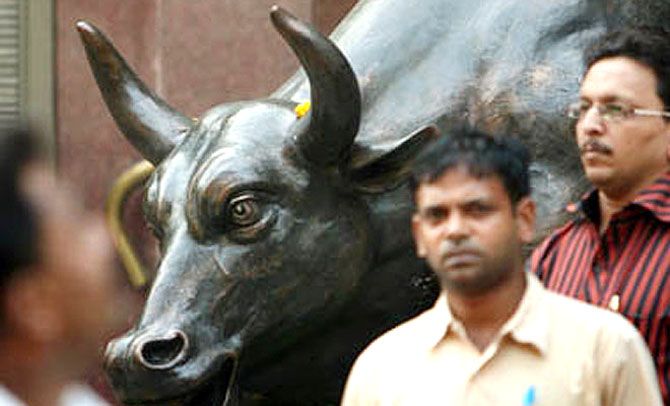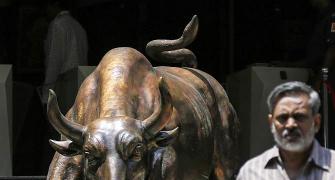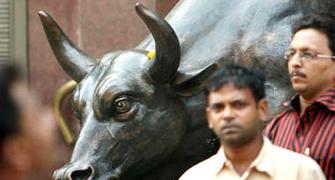Monday's steep fall turned Sensex's yearly returns to - 2.57%, but only two large-cap funds did worse.
 Financial planners always ask investors to make large-cap funds the backbone of any investment portfolio. And it is for a good reason.
Financial planners always ask investors to make large-cap funds the backbone of any investment portfolio. And it is for a good reason.
On Monday, when the Sensex fell 1,600 points, the annual returns of the benchmark index turned negative at -2.57 per cent. But almost all large-cap funds withstood the shock.
According to data from Value Research, amid over 45 actively-managed large-cap funds, only two funds have performed worse than the Sensex in the past year. All the others have beaten it comfortably.
The best performer has returned as much as 14 per cent. The best scheme, IDBI India Top 100 Equity has returned 13.44 per cent.
There are as many as seven funds, which have given returns of over 10 per cent. The story is same over the five-year period as well.
Only a handful, eight, have performed worse than the Sensex.
Vikaas Sachdeva, CEO, Edelweiss Mutual Fund, says, “One invests when one is both comfortable and convinced about an investment avenue. Large-cap funds in the past year work on both counts.”
Chetan Tandel learnt a lesson on the Monday's fall. When Tandel went and check his schemes’ performance, he was relieved to see that his investments of Rs 1.3 lakh via systematic investment plans in the past one year was marginally up at Rs 1,30,138.
Better still, his other two schemes, in which he had invested five years back, were giving him an annualised return of 15.16 per cent and 13.99 per cent returns.
In total: His total investments of Rs 6.1 lakh had grown to Rs 8.75 lakh despite the market mayhem.
Malhar Majumder, a certified financial planner, says investors should not worry on such movements, especially when it’s due to global market affecting Indian stocks.
Things are looking up for the country. The economy is in the recovery stage and the interest rates are gradually going to reduce.
The best thing to do in such a situation is to follow the asset allocation strategy. Say, your portfolio comprises 70 per cent equity and 30 per cent debt, there should be at least 40-50 per cent of the money in large-cap funds.
After that, you can tinker with mid-cap or small-cap or international and other variety of schemes. Lovaii Navlakhi, founder and CEO of International Money Matters, says within each asset, an investor should keep a 5-10 per cent margin, depending on the risk-profile, before tinkering with the portfolio.
If a person maintains 70 per cent equity, then they should not tinker unless the equity goes beyond 80 per cent or falls below 60 per cent. Once the allocation breaches this band, investors can accumulate or sell.
The longer an investor stays in the market, the lesser is the risk of losing money and market volatility affecting a person. Some of the older funds, launched before 2000 reflect this.
HDFC Top 200, (since 1996), has annualised returns of 21.32 per cent. Similarly, Franklin India Bluechip Fund, (since 1993), has 22.40 per cent annual returns and Reliance Growth Fund (since 1995) has returned 24.52 per cent.










